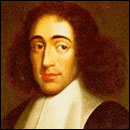

on the Theologico-Politicus Treatise
the book as test (Incomplete)
From Theologico-Political Treatise
Chapter I - Of Prophecy.
Page 3 – miracles are unusual natural events whose cause is unknown
Page 4 – on the word Spirit and that (Deus sive Natura) has neither body or mind
Page 5 – to know the natural world is to know (Deus sive Natura)
Page 6 – questioning the prophets
Chapter II - Of Prophets.
Page 2 – the prophets are not to be trusted in matters of the intellect
Chapter III - Of the Vocation of the Hebrews, and whether the Gift of Prophecy was peculiar to them.
Page 1– true happiness is found in wisdom and truth which all can share
Page 2 – everything happens according to natural laws
Page 3 – knowledge and control of the emotions will help establish the good life
Page 4 – the Jews are in no way exceptionally favored
Chapter IV - Of the Divine Law.
Page 1 – of Laws, man-made and natural
Page 2 – the more we know of natural phenomena the more we know of (Deus sive Natura)
Page 4 – the Bible and religious ceremonies have nothing to do with Natural law
Page 5 – the 10 commandments were conceived as laws given by a law-giver deity not as eternal truths
Page 6 – Christ was different from the prophets
Page 7 – the search for knowledge is more important than Biblical injunctions
Page 8 – conclusion – scripture and reason agree
Chapter V - Of the Ceremonial Law
Page 1 – of ceremonial law and the 10 commandments
Page 2 – on the benefits of society and the need for laws
Page 3 – on the origin of ceremonial law - but laws are best made by the governed
Page 4 – on Christian rites - briefly
Page 5 – Scriptural stories nessesary for the masses do not use logical reasoning